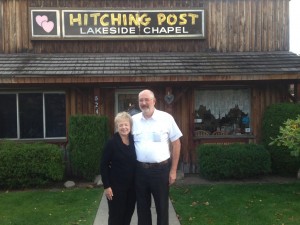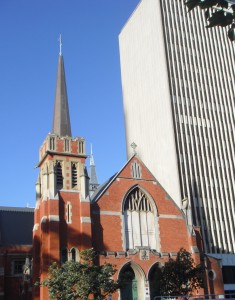4 Things You Need to Know About the “Hitching Post” Case
 We have written recently about two ministers (Mr. and Mrs. Knapp) in Coeur d’Alene, Idaho, who face the prospect of fines and jail time for failing to permit a same-sex wedding at their wedding chapel.
We have written recently about two ministers (Mr. and Mrs. Knapp) in Coeur d’Alene, Idaho, who face the prospect of fines and jail time for failing to permit a same-sex wedding at their wedding chapel.
Same-sex marriage became legal in Idaho a few weeks ago when the U.S. Supreme Court declined to hear an appeal over a lower court ruling striking the state’s marriage laws. According to attorneys from Alliance Defending Freedom–who is representing the ministers–city officials told the pair multiple times that their wedding chapel would be required to perform same-sex weddings. The ministers filed suit against the city. Now the city is backing off, saying that because the wedding chapel is a nonprofit entity, they won’t be required to perform same-sex weddings after all.
There’s just one problem, ADF writes: The Hitching Post Wedding Chapel is not non-profit. It is a for-profit chapel. In fact, ADF says there are four things that need to be set straight about this case concerning religious liberty:
- The Hitching Post is a for-profit corporation, and it always has been.
- The city, on at least three separate occasions, made clear that because the Hitching Post is a for-profit company the Knapps would be in violation of the law and subject to criminal prosecution and punishment if they declined to perform same-sex marriages.
- The lawsuit is not premature.
- Idaho’s religious freedom laws should protect the ministers and their business.
This is a critical case for religious liberty in America. The U.S. Supreme Court’s recent ruling in the Hobby Lobby case makes it clear that business owners do not forfeit religious liberty by entering the marketplace. In America, you are not only free to engage in business, but to do so in a manor consistent with your deeply-held convictions.

 After two weeks of controversy, the Mayor of Houston has withdrawn subpoenas of church sermons from local pastors.
After two weeks of controversy, the Mayor of Houston has withdrawn subpoenas of church sermons from local pastors. One of the selling points of the Arkansas Lottery was that it would send more students to college and bring more college graduates into Arkansas’ workforce. However, as the Lottery celebrates its fifth anniversary, college graduation statistics seem to show the Arkansas Lottery isn’t living up to its promises.
One of the selling points of the Arkansas Lottery was that it would send more students to college and bring more college graduates into Arkansas’ workforce. However, as the Lottery celebrates its fifth anniversary, college graduation statistics seem to show the Arkansas Lottery isn’t living up to its promises.